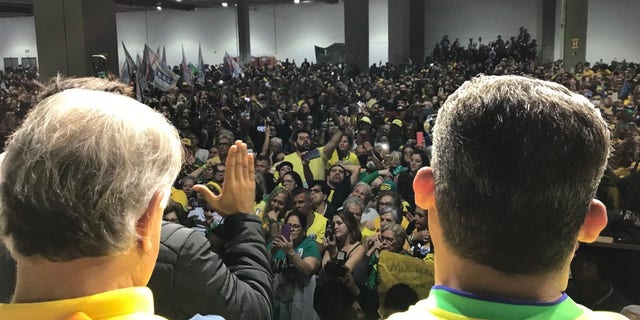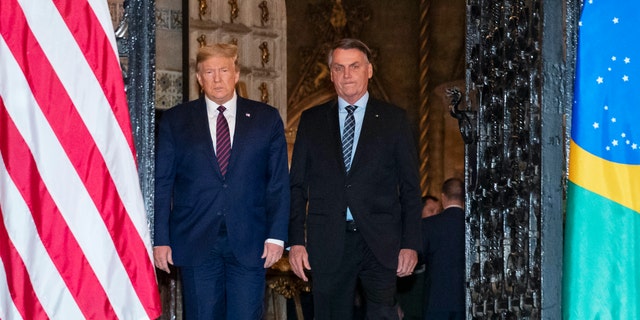Brazil’s Bolsonaro locked in tough re-election bid with leftist candidate Lula leading in polls
SAO PAULO, Brazil – As swirling mists and light rain rolled in from the Atlantic over the port city of Santos, embattled incumbent President Jair Bolsonaro, who is locked in a tough re-election bid with leftist icon Lula da Silva, roared into a rockstar reception at a packed convention center at the head of a motorcade of two dozen motorcycles. In Brazilian politics, all roads lead to Sao Paulo, a state of 45 million people, which constitutes 22% of the Brazilian electorate. The energy was palpable as thousands of flag-waving party supporters chanted, “Mito! Mito! Mito!” (legend).
Bolsonaro wasted no time in launching into his opponent, the gravelly voiced union leader Lula, deeming him “the greatest thief in the history of Brazil,” to thunderous acclaim. His son Eduardo Bolsonaro, a federal deputy for Sao Paulo, worked the crowd and posed for selfies with delighted supporters.
Lula da Silva closed his campaign earlier in the week in Anhembi, Sao Paulo, with an event featuring a who’s who of Brazilian artists and musicians and a video appearance by outspoken Pink Floyd frontman Roger Waters, a longtime Lula admirer. Lula presented himself as a great unifier and blamed Bolsonaro for the nation’s divisive climate, saying, “The time of hate and war is over” while promising “a time of peace, democracy, unity, prosperity, love and hope.”
BRAZILIAN JUDGE TEMPORARILY SUSPENDS EASING OF GUN CONTROL LAWS DUE TO ELECTION VIOLENCE FEARS
The frontrunner, Lula finds himself on a remarkable political roller-coaster ride, from beloved ex-president, to reviled paragon of corruption, to an inmate serving a 12-year sentence, to a sympathetic figure of wrongly persecuted politician seeking redemption, to presidential frontrunner.
It’s an unprecedented turn of events for the Workers Party, who saw their president, Dilma Rousseff, unceremoniously impeached by the Brazilian Congress in 2016, and then lost the 2018 election by a wide margin.
Political analyst Cristian Derosa notes that “The reason for Lula leading in the polls is still a mystery. The fact is that the anti-Workers Party movements had some specificities. Dilma was not Lula, and this made it difficult for the left to come out in force in her defense. Second, there was a political negotiation operation to, let’s say, hand over Dilma’s head to the people in order to preserve the entire system. With that, the anti-Workers Party movement was temporarily satisfied and neutralized … but Michel Temer, the great ‘butler’ of the republic, was in power as a guardian of the establishment.” Temer served as Brazil’s president before Bolsonaro came to power.
It is this establishment that loathes Bolsonaro and has now unified around Lula with remarkable efficiency and discipline.
TRUMP GREETS BRAZILIAN PRESIDENT JAIR BOLSONARO, SAYS ‘STRONGLY’ CONSIDERING NATO PRIVILEGES FOR BRAZIL

Yet, the tempestuous Brazilian presidential election is beset with great ironies: while incumbent Jair Bolsonaro is routinely criticized for injecting violence into the political debate, he himself was a victim of a near-fatal stabbing on the campaign trail in 2018. While Lula leads the charge that Bolsonaro will not respect the results of a democratic election and embraces military dictatorship, it is Lula himself who has built a foreign policy on uniting a who’s who of leftist military dictatorships for an annual geopolitical pow-wow, under the auspices of the Sao Paulo Forum.
Nonetheless, Bolsonaro is certainly not blameless for the precarious position in which he finds himself. To say that Bolsonaro is viewed unfavorably by the Brazilian and international media is putting it mildly. He has reveled in his “Trump of the Tropics” role, and he lives to antagonize the media, much like his counterpart from the Northern Hemisphere.
Also like Trump, Bolsonaro has experienced difficulties in building the kind of political coalitions necessary to pass legislation and govern. The Bolsonaro movement is known for frequent infighting and power struggles.

However, despite the international media’s frequent depiction of Brazil as a failed state, the nation has fared reasonably well during the pandemic compared to its peers. Paulo Guedes, a University of Chicago-trained economist, has kept a steady hand on the reins of the economy.
As Daniel Raisbeck, Latin American policy analyst at the Cato Institute, notes, “Bolsonaro’s government has taken actions to free Brazil’s highly bureaucratized economy, among them the “Economic Freedom Act” to reduce interventionism, and other measures to simplify business operations,” yet believes “he moved too slowly to privatize Petrobras, the majority state-owned oil concern.”
BRAZIL PRESIDENT RIPS LEONARDO DICAPRIO OVER AMAZON DEFORESTATION TWEET: ‘GIVE UP YOUR YACHT BEFORE LECTURING’
The first-round election will take place on October 2, followed by a second round on October 30 if no candidate wins 50%.
Bolsonaro has lagged in the polls, as the Brazilian public seems to have forgotten or ignored Lula’s corruption conviction, which the Supreme Court overturned on a technicality. Political analyst Flavio Morgenstern argues, “Without getting Lula out of jail, the left’s chance against Bolsonaro would be zero.”
The Bolsonaro camp believes that the polls are flawed, pointing to erroneous predictions in previous congressional races, and suggests that the results will be much tighter than current polls indicate. Goldman Sachs, in a report for its clients last week, shared a similar view, noting that actual results could diverge from polls. Still, Lula’s support has been ticking upwards recently, with the last five polls giving him leads of between 7% and 17%.

Nycollas Liberato, president of the classical liberal group Brazil Students for Liberty, notes, “It is frowned upon in countless social circles to be a Bolsonaro supporter” and believes that “embarrassed voters” (those reluctant to admit their Bolsonaro support to a pollster) may make for a surprise on election day.
Liberato noted that “although many polls show the possibility of Lula winning in the first round, I would say that the possibility of a second round is 70%.”
Read the full article Here


